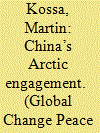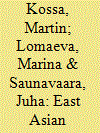| Srl | Item |
| 1 |
ID:
173968


|
|
|
|
|
| Summary/Abstract |
Environmental changes in the Arctic region attract global attention. China, with its growing power, has been steadily increasing its presence in the region and in January 2018 published its first Arctic policy paper. At the same time, there are numerous actors within China that are interested in the Arctic and have the capacity to influence China’s Arctic decision-making process. However, what is less clear, is how China’s Arctic policy is being formulated across the Chinese government and what role different subnational actors play in its formulation and implementation. This research seeks to fill this gap. Drawing on fieldwork and Chinese texts, this study aspires to further develop our understanding of the workings behind Chinese state policy formation.
|
|
|
|
|
|
|
|
|
|
|
|
|
|
|
|
| 2 |
ID:
179542


|
|
|
|
|
| Summary/Abstract |
The globalised Arctic has in recent years witnessed an influx of extra-regional actors, many of whom come from East Asia. Although there is an abundance of analysis of the roles of East Asian nation-states—including Japan and China—in Arctic governance and resource development, research on East Asian subnational governments’ (SNGs) increased Arctic engagement has not drawn much attention. Leaning on the concept of paradiplomacy and being particularly inspired by Alexander S. Kuznetsov’s explanatory framework for the study of SNGs’ involvement in international relations, this study examines the motives behind East Asian subnational governments’ involvement in Arctic affairs and the attitudes of national governments towards this involvement. Based on the study of Hokkaido Prefecture in Japan and the provinces of Heilongjiang, Jilin and Liaoning in China, this article argues that the East Asian SNGs’ Arctic initiatives are mainly based on economic objectives, especially those connected with new transportation routes in the Arctic Ocean. Scientific cooperation also plays an important role in the evolving subnational Arctic engagement. At the national level, East Asian SNGs are actively interacting with their respective central governments, which have, in general, been supportive of their Arctic endeavours.
|
|
|
|
|
|
|
|
|
|
|
|
|
|
|
|